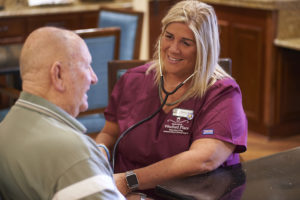

 For many of us, taking medicine is a normal, often unavoidable, part of daily life. That means we must be aware of the unwanted side effects these medications sometimes cause – including the risk of medication-related falls. According to the National Institutes of Health, falls are the leading cause of injury among adults aged 65 and older.
For many of us, taking medicine is a normal, often unavoidable, part of daily life. That means we must be aware of the unwanted side effects these medications sometimes cause – including the risk of medication-related falls. According to the National Institutes of Health, falls are the leading cause of injury among adults aged 65 and older.
When we think about fall prevention, we tend to focus on our physical surroundings. We remove tripping hazards like throw-rugs and extensions cords. We get rid of unnecessary clutter. We install hand grips and non-slip bathtub mats. These are all great precautions to take, but we also need to remember that certain medications can make us more susceptible to falling. In this post, we’ll explore your medication fall risk in more detail and we’ll offer suggestions for what to do about it.
The most common medications that can increase our risk of falling can be grouped into three main categories:
If you already know you’re taking medication that fits into either of these categories, you’ll definitely want to stick around to the end of this article to see our suggestions on how to prevent medication-related falls. If you aren’t sure about your prescriptions, a simple conversation with your pharmacist or doctor is all it takes to find out. If you’re taking multiple medications, your doctor or pharmacist can also tell you about potential drug interactions that may further increase your medication fall risk.
1. Insist on Annual Medication Reviews: Many different medications can increase your fall risk – too many to list here. An annual medication review conducted by a qualified healthcare provider (your pharmacist or doctor, for example) is a great way to identify these risks. As you work together with your healthcare provider, make sure to mention that you’re concerned about falling and you want to reduce or eliminate medications that put you at risk.
2. Decide if the Benefits Outweigh the Risks: If you find that you are taking one or more medications associated with increased fall risk, your healthcare providers might be able to recommend alternative treatments. In the absence of viable alternatives, you’ll need to consider whether the benefits outweigh the negatives – just like you would for any other side effect.
3. Practice Good Medication Management Habits: Accidentally skipping a dose or taking more than prescribed can also increase your risk of medication-related falls. Keep your medications organized and ask for help if you’re having trouble taking your medication consistently.
4. Consider Vitamin D Supplements: Check your vitamin D level. Clinically low vitamin D deficiency is associated with increased fall risk in older adults and taking a supplement of at least 800 units per day could help.
5. Take Risky Medications at Bedtime: If the medication you need is known to pose a fall risk, try taking it at night time before bed. Of course, before altering your medication schedule, always talk to your doctor first. There could be other important factors to consider beyond your risk of a medication-related fall.
Medication management is just one way to help reduce your risk of falling. For even more great tips, don’t miss our companion piece, “Home Safety Tips for Aging in Place.” In this post, you’ll discover a variety of helpful suggestions that can make your home more accommodating as you age. Or to learn more about the vibrant lifestyle options at Senior Star, contact us today.